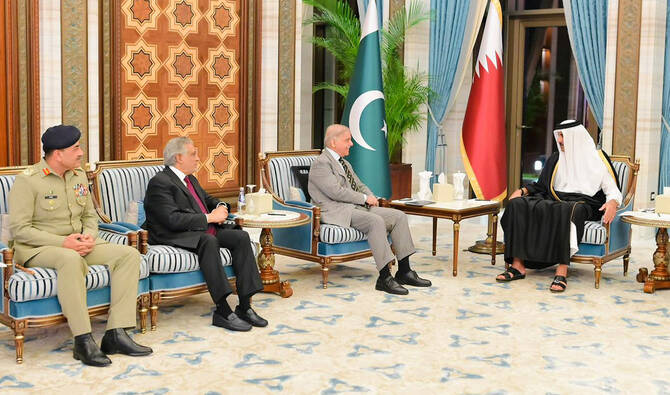ISLAMABAD: The Islamabad administration on Monday refused to give permission to both the Pakistani government and the opposition to hold rallies in the capital’s Red Zone, with regard to a no-confidence motion against Prime Minister Imran Khan, Pakistani media reported.
An alliance of opposition parties filed the motion on March 8, saying PM Khan had lost his parliamentary majority after over a dozen defections from his party. The opposition accuses PM Khan of mismanaging the economy and foreign policy, and poorly governing the country.
The National Assembly of Pakistan will meet on Friday to take up the no-confidence motion.
Both sides promised to gather hundreds of thousands of supporters in the federal capital’s Red Zone, a heavily protected area and home to major government offices and foreign embassies, raising fears of violence.
But the two sides have been denied the permission to rally their supporters to the sensitive area, the Express Tribune newspaper reported.
“The ICT administration is of the opinion that since both the government and the opposition were seeking the same venue, there was a possibility of a clash between the participants,” the report read.
“It also said that holding rallies in the Red Zone would also create security concerns.”
Ali Nawaz Awan, a member of PM Khan’s Pakistan Tehreek-e-Insaf (PTI) party, said they have now decided to hold the March 27 public gathering at the Parade Ground as it would prove to be the best venue for the number of people attending the rally.
“Islamabad administration has been submitted a request for the change of venue,” Awan said on Twitter.
Earlier, an alliance of opposition parties, the Pakistan Democratic Movement (PDM), announced a joint public meeting at the Constitution Avenue in Islamabad on March 23.
The opposition alliance later changed the date to March 25 in view of a meeting of the Organization of Islamic Cooperation’s (OIC) Council of Foreign Ministers and the Pakistan Day parade.
Pakistan is hosting the two-day OIC foreign ministers conference on March 22-23.
Pakistan government, opposition denied permission to hold rallies in Islamabad’s Red Zone
https://arab.news/vhtdv
Pakistan government, opposition denied permission to hold rallies in Islamabad’s Red Zone

- Islamabad administration feared violence after both sides promised to gather supporters in the same vicinity
- The rallies have been announced with regard to a no-confidence motion filed against Prime Minister Imran Khan
Qatar, Pakistan resolve to boost strategic, economic cooperation at Doha talks

- Both countries urge dialogue on Afghanistan amid renewed border tensions between Islamabad and Kabul
- Discussions focus on bilateral trade and investment, energy, defense, manpower and labor and culture
ISLAMABAD: Pakistan and Qatar on Tuesday agreed to deepen their strategic and economic cooperation during high-level talks between Prime Minister Shehbaz Sharif and his Qatari counterpart Sheikh Mohammed bin Abdulrahman bin Jassim Al Thani, Sharif’s office said.
Sharif visited Qatar along with a high-level delegation on the invitation of Qatari emir Sheikh Tamim bin Hamad Al Thani. The Pakistani premier also held meetings with Qatar’s trade and defense ministers to discuss cooperation in various domains.
The visit came at a time when Pakistan is seeking closer economic engagement with Gulf partners amid its broader push to stabilize the economy and attract investment, while maintaining security and defense cooperation with key regional states.
During their meeting in Doha, PM Sharif and Qatar’s Sheikh Mohammed discussed bilateral relations and exchanged views on regional and international developments, according to the Pakistan prime minister’s office.
“They reaffirmed the strong brotherly relations between Pakistan and Qatar and expressed satisfaction at the growing momentum in political, economic and institutional ties,” Sharif’s office said.
“Discussions focused on enhancing cooperation in the fields of trade and investment, energy, defense, manpower and labor and culture, with both sides stressing the importance of their task force to accelerate cooperation in all these areas.”
Pakistan and Qatar maintain strong trade and investment ties. In 2022, the office of Qatar’s emir said the Qatar Investment Authority planned to invest $3 billion in Pakistan, targeting sectors including transport, aviation, education, health, media, technology and labor.
Nearly 300,000 Pakistanis live and work in Qatar, according to Pakistan’s foreign office, with many employed in health, education, engineering and public services, as well as construction and transport. The two countries engage through forums such as the Bilateral Political Consultations and the Joint Ministerial Commission.
Sharif said he had productive discussions with Qatar’s emir, Sheikh Tamim bin Hamad Al Thani, on how the two sides could transform their brotherly ties into mutually beneficial economic relationships.
“We also took stock of the regional situation,” he said on X. “Pakistan and Qatar will continue to work together for peace and stability in the region and beyond.”

DIALOGUE WITH AFGHANISTAN
Earlier, Sharif and Qatar’s Deputy PM Sheikh Saoud Al-Thani discussed the situation in Afghanistan and called for dialogue to support regional stability.
The meeting took place amid renewed tensions after Islamabad carried out airstrikes last week on what it described as Tehreek-e-Taliban Pakistan (TTP) targets inside Afghanistan. Kabul said the strikes killed civilians and vowed to respond to what it called a violation of its sovereignty.
“Regional developments were also discussed, in particular the situation in Iran and Afghanistan,” Sharif’s office said in a statement. “Both sides emphasized the importance of dialogue, de-escalation and collective efforts to promote peace and stability in the region.”
This was the second time in less than six months that Pakistan conducted airstrikes in Afghanistan. The last strikes triggered heavy, weeklong clashes between the neighbors along their border before Qatar and Turkiye mediated a ceasefire between them in Oct. last year.
Separately, Sharif held meetings with Qatar’s State Minister for Trade Dr. Ahmed bin Mohammed Al-Sayed and a delegation of the Qatar Businessmen Association (QBA), highlighting Pakistan’s investment-friendly reforms.
He invited QBA members to explore opportunities in infrastructure, logistics, energy, agriculture, technology and export-oriented manufacturing, his office said.










